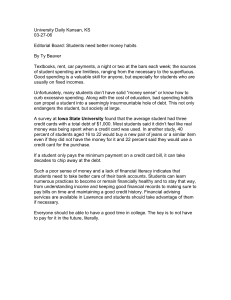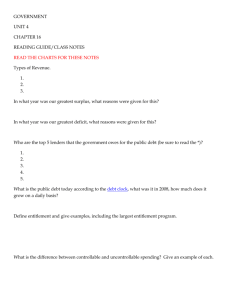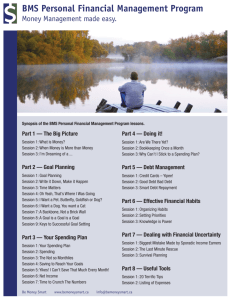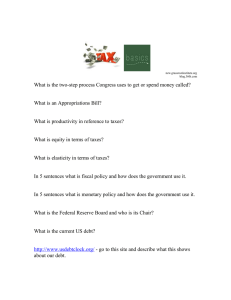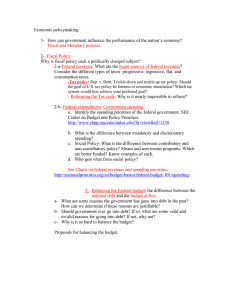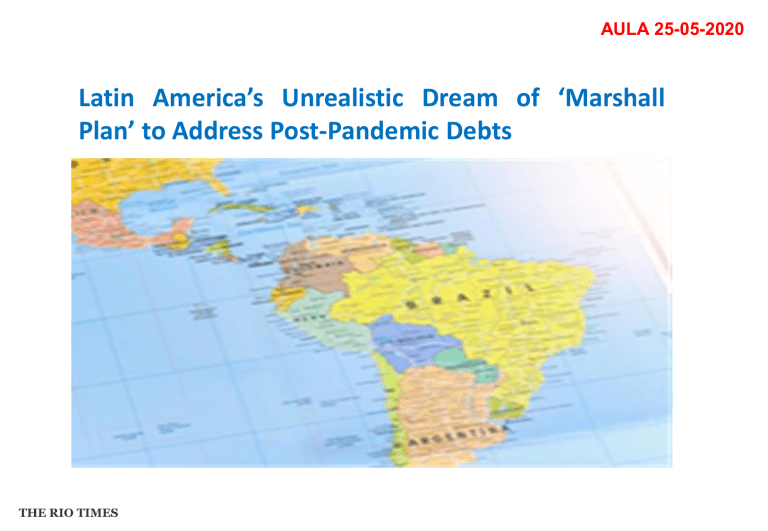
AULA 25-05-2020 Latin America’s Unrealistic Dream of ‘Marshall Plan’ to Address Post-Pandemic Debts THE RIO TIMES Latin America’s Unrealistic Dream of ‘Marshall Plan’ to Address PostPandemic Debts Experts alert to the additional risk of the pandemic for the region's most indebted countries. RIO DE JANEIRO, BRAZIL – A mountain of debt at the end of this pandemic awaits governments spending to mitigate its economic impacts. According to the World Bank’s most recent data, Latin America and the Caribbean totaled a combined foreign debt of US$1.87 trillion (R$10.5 trillion) in 2018. ˈlætn̩ əˈmɛrəkəz ˌʌnˌriːəˈlɪstɪk ˈdriːm əv ‘ˈmɑrʃəl ˈplæn' ˈtʰuː əˈdrɛs ˈpʰoʊst- pænˈdɛmɪk ˈdɛts ˈɛkˌspɝts əˈlɝt ˈtʰuː ðiː əˈdɪʃənl̩ ˈrɪsk əv ðə pænˈdɛmɪk ˈfɔr ðə ˈriːdʒənz ˈmoʊst ɪnˈdɛtəd ˈkʰʌntriːz. ˈriːoʊ ˈdeɪ dʒəˈnɛˌroʊ, brəˈzɪl – ə ˈmaʊntn̩ əv ˈdɛt ət ðiː ˈɛnd əv ˈðɪs pænˈdɛmɪk əˈweɪts ˈɡʌvɚmənts ˈspɛndɪŋ ˈtʰuː ˈmɪtəˌɡeɪt ˈɪts ˌɛkəˈnɑmɪk ˈɪmˌpækts. əˈkʰɔrdɪŋ ˈtʰuː ðə ˈwɝld ˈbæŋks ˈmoʊst ˈriːsn̩t ˈdeɪtə, ˈlætn̩ əˈmɛrəkə ənd ðə ˌkɛrəˈbiːən ˈtʰoʊtl̩ d ə kəmˈbaɪnd ˈfɔrən ˈdɛt əv /US$one/ ˈtrɪljən (/R$ten/ ˈtrɪljən) ˈɪn ˈtʰuː ˈθaʊzənd ˌeɪtˈtʰiːn. 1- Even before the advent of Covid-19, the International Monetary Fund (IMF) cautioned about the risks of this growing debt, but now, for many countries, debt is the only option to provide their citizens with what they need to survive while the virus hinders paid work. 2- If anyone expects the international community and multilateral organizations to help the wealthiest countries rescue the neediest, the facts point in the opposite direction. Each government is so committed to serving its people that there is neither the time nor the will to organize a plan like the one implemented in Europe after the Second World War. Such a plan would not even work, critics say, because the world today is different from the post-war world. 1- ˈiːvən bɪˈfɔr ðiː ˈædˌvɛnt əv /Covid-nineteen/, ðiː ˌɪntɚˈnæʃənl̩ ˈmɑnəˌtɛrɪ ˈfʌnd (ˈaɪ-ˈɛm-ˈɛf) ˈkʰɔʃənd əˈbaʊt ðə ˈrɪsks əv ˈðɪs ˈɡroʊɪŋ ˈdɛt, ˈbʌt ˈnaʊ, ˈfɔr ˈmɛnɪ ˈkʰʌntriːz, ˈdɛt ˈɪz ðiː ˈoʊnlɪ ˈɑpʃən ˈtʰuː prəˈvaɪd ˈðɛr ˈsɪtəzənz ˈwɪθ ˈwɑt ˈðeɪ ˈniːd ˈtʰuː sɚˈvaɪv ˈwaɪəl ðə ˈvaɪrəs ˈhɪndɚz ˈpʰeɪd ˈwɝk. 2- ˈɪf ˈɛniːˌwʌn ɪkˈspɛkts ðiː ˌɪntɚˈnæʃənl̩ kəˈmjuːnətɪ ənd ˌmʌltiːˈlætɚrəl ˌɔrɡənəˈzeɪʃənz ˈtʰuː ˈhɛlp ðə ˈwɛlθiːəst ˈkʰʌntriːz ˈrɛskjuː ðə ˈniːdiːəst, ðə ˈfækts ˈpʰɔɪnt ˈɪn ðiː ˈɑpəzət dɚˈrɛkʃən. ˈiːtʃ ˈɡʌvɚmənt ˈɪz ˈsoʊ kəˈmɪtəd ˈtʰuː ˈsɝvɪŋ ˈɪts ˈpʰiːpəl ˈðæt ˈðɛr ˈɪz ˈniːðɚ ðə ˈtʰaɪm ˈnɔr ðə ˈwɪl ˈtʰuː ˈɔrɡəˌnaɪz ə ˈplæn ˈlaɪk ðə ˈwʌn ˈɪmpləˌmɛntəd ˈɪn ˈjʊrəp ˈæftɚ ðə ˈsɛkənd ˈwɝld ˈwɔr. ˈsʌtʃ ə ˈplæn wəd ˈnɑt ˈiːvən ˈwɝk, ˈkrɪtɪks ˈseɪ, bɪˈkʰɔz ðə ˈwɝld təˈdeɪ ˈɪz ˈdɪfrənt frəm ðə ˈpʰoʊst-ˈwɔr ˈwɝld. 3- The debt tends to be seen as a buffer, a blow-absorbing device, explains Alejandro Izquierdo, senior advisor to the Research Department of the Inter- American Development Bank (IDB). “This justifies using the buffer at such a critical time. On the other hand, we have to demand that governments reduce spending and become more efficient, because otherwise, the youths will have to pay for it”. 4- Latin America has a poor track record when it comes to spending its money. A survey by Izquierdo and his peers shows that each year Latin American and Caribbean governments’ inefficiency in spending generates a total loss of US$220 billion, equivalent to 4.4 percent of regional GDP. This means that at times of global crisis and pandemic, increasing spending does not necessarily translate into an economic rebound. 3- ðə ˈdɛt ˈtʰɛndz ˈtʰuː ˈbiː ˈsiːn ˈæz ə ˈbʌfɚ, ə ˈbloʊ-əbˈsɔrbɪŋ dɪˈvaɪs, ɪkˈspleɪnz ɑleˈhɑndroʊɑleˈhɑndroʊ ɑleˈjɑndroʊ ɪzˈkwɪrdoʊ, ˈsiːnjɚ ədˈvaɪzɚ ˈtʰuː ðə ˈriːˌsɝtʃ dɪˈpʰɑrtmənt əv ðiː ɪnˈtʰɝ-əˈmɛrəkən dɪˈvɛləpmənt ˈbæŋk (ˈaɪ-ˈdiː-ˈbiː). “ˈðɪs ˈdʒʌstəˌfaɪz ˈjuːzɪŋ ðə ˈbʌfɚ ət ˈsʌtʃ ə ˈkrɪtɪkəl ˈtʰaɪm. ˈɔn ðiː ˈʌðɚ ˈhænd, ˈwiː ˈhæf tə dɪˈmænd ˈðæt ˈɡʌvɚmənts rɪˈduːs ˈspɛndɪŋ ənd bɪˈkʰʌm ˈmɔr ɪˈfɪʃənt, bɪˈkʰɔz ˈʌðɚˌwaɪz, ðə ˈjuːðz ˈwɪl ˈhæf tə ˈpʰeɪ ˈfɔr ˈɪt”. 4- ˈlætn̩ əˈmɛrəkə ˈhæz ə ˈpʰʊr ˈtræk ˈrɛkɚd ˈwɛn ˈɪt ˈkʰʌmz ˈtʰuː ˈspɛndɪŋ ˈɪts ˈmʌnɪ. ə ˈsɝˌveɪ ˈbaɪ ɪzˈkwɪrdoʊ ənd ˈhɪz ˈpʰɪrz ˈʃoʊz ˈðæt ˈiːtʃ ˈjɪr ˈlætn̩ əˈmɛrəkən ənd ˌkɛrəˈbiːən ˈɡʌvɚmənts' ˌɪnəˈfɪʃənsɪ ˈɪn ˈspɛndɪŋ ˈdʒɛnɚˌreɪts ə ˈtʰoʊtl̩ ˈlɔs əv /US$two/ ˈhʌndrəd ˈtwɛntɪ ˈbɪljən, ɪˈkwɪvələnt ˈtʰuː ˈfɔr pɚˈsɛnt əv ˈriːdʒənl̩ ˈɡiːˈdiːˈpʰɪ. ˈðɪs ˈmiːnz ˈðæt ət ˈtʰaɪmz əv ˈɡloʊbəl ˈkraɪsəs ənd pænˈdɛmɪk, ɪnˈkriːsɪŋ ˈspɛndɪŋ ˈdʌz ˈnɑt ˌnɛsəˈsɛrəlɪ trænsˈleɪt ˈɪntuː ən ˌɛkəˈnɑmɪk ˈriːˌbaʊnd. 5- The IDB has singled out three spending components that, while they may have been well-intentioned, are typically a bottomless drain on governments: targeted transfers, lack of transparency in public procurement, and high employee compensation. 6- “It makes sense at this time for the debt to increase, but I believe that there is also a responsibility that must be asked of governments: that in the future this additional spending should not become permanent spending, and that it should work on efficient spending so that fiscal surpluses that reduce the extent of debt may eventually be achieved,” says Izquierdo. “Citizens have a right to demand this because, otherwise, future generations will always be paying for the damage.” 7- Mexico, the second-largest economy in the region, stands out for its reluctance to increase its indebtedness to cope with the economic shutdown triggered by the pandemic. The country enjoys healthy finances and a manageable fiscal deficit, so if it wanted to, it could run up more debt. 5- ðiː ˈaɪ-ˈdiː-ˈbiː ˈhæz ˈsɪŋɡəld ˈaʊt ˈθriː ˈspɛndɪŋ kəmˈpʰoʊnənts ˈðæt, ˈwaɪəl ˈðeɪ ˈmeɪ ˈhævˈhæv əv ˈbɪn ˌwɛlɪnˈtʰɛnʃənd, ˈɑr ˈtʰɪpɪklɪ ə ˈbɑtəmləs ˈdreɪn ˈɔn ˈɡʌvɚmənts: ˈtʰɑrɡətəd trænsˈfɝz, ˈlæk əv trænsˈpʰɛrənsɪ ˈɪn ˈpʰʌblɪk prəˈkʰjʊrmənt, ənd ˈhaɪ ɪmˌplɔɪˈiː ˌkɑmpənˈseɪʃən. 6- “ˈɪt ˈmeɪks ˈsɛns ət ˈðɪs ˈtʰaɪm ˈfɔr ðə ˈdɛt ˈtʰuː ɪnˈkriːs, ˈbʌt ˈaɪ bəˈliːv ˈðæt ˈðɛr ˈɪz ˈɔlˌsoʊ ə rɪˌspɑnsəˈbɪlətɪ ˈðæt ˈmʌst ˈbiː ˈæskt əv ˈɡʌvɚmənts: ˈðæt ˈɪn ðə ˈfjuːtʃɚ ˈðɪs əˈdɪʃənl̩ ˈspɛndɪŋ ʃəd ˈnɑt bɪˈkʰʌm ˈpʰɝmənənt ˈspɛndɪŋ, ənd ˈðæt ˈɪt ʃəd ˈwɝk ˈɔn ɪˈfɪʃənt ˈspɛndɪŋ ˈsoʊ ˈðæt ˈfɪskəl ˈsɝpləsəz ˈðæt rɪˈduːs ðiː ɪkˈstɛnt əv ˈdɛt ˈmeɪ ɪˈvɛntʃəwəlɪ ˈbiː əˈtʃiːvd,” ˈsɛz ɪzˈkwɪrdoʊ. “ˈsɪtəzənz ˈhæv ə ˈraɪt ˈtʰuː dɪˈmænd ˈðɪs bɪˈkʰɔz, ˈʌðɚˌwaɪz, ˈfjuːtʃɚ ˌdʒɛnɚˈreɪʃənz ˈwɪl ˈɔlˌweɪz ˈbiː ˈpʰeɪɪŋ ˈfɔr ðə ˈdæmɪdʒ.” 7- ˈmɛksɪˌkoʊ, ðə ˈsɛkənd-ˈlɑrdʒəst ɪˈkʰɑnəmɪ ˈɪn ðə ˈriːdʒən, ˈstændz ˈaʊt ˈfɔr ˈɪts rɪˈlʌktəns ˈtʰuː ɪnˈkriːs ˈɪts ɪnˈdɛtədnəs ˈtʰuː ˈkʰoʊp ˈwɪθ ðiː ˌɛkəˈnɑmɪk ˈʃʌtˌdaʊn ˈtrɪɡɚd ˈbaɪ ðə pænˈdɛmɪk. ðə ˈkʰʌntrɪ ɪnˈdʒɔɪz ˈhɛlθɪ ˈfaɪˌnænsəz ənd ə ˈmænɪdʒəbəl ˈfɪskəl ˈdɛfəsət, ˈsoʊ ˈɪf ˈɪt ˈwɔntəd ˈtʰuː, ˈɪt kəd ˈrʌn ˈʌp ˈmɔr ˈdɛt. What Latin America expects 1- The region will suffer the worst economic contraction in its history this year, according to the Economic Commission for Latin America and the Caribbean (ECLAC). The blow will be a drop of 5.3 percent in GDP. The International Labor Organization (ILO) estimated last month that the pandemic has already destroyed at least 14 million jobs in the region. 2- The scenario is such that wartime comparisons are ubiquitous, and in line with European authorities, Mexican President Andrés Manuel López Obrador called for the establishment of a new Marshall Plan, referring to the transfers of resources from the United States to European countries in 1948, as post-war aid and to be spent exclusively on economic reconstruction programs. ˈwɑt ˈlætn̩ əˈmɛrəkə ɪkˈspɛkts 1- ðə ˈriːdʒən ˈwɪl ˈsʌfɚ ðə ˈwɝst ˌɛkəˈnɑmɪk kənˈtrækʃən ˈɪn ˈɪts ˈhɪstɚrɪ ˈðɪs ˈjɪr, əˈkʰɔrdɪŋ ˈtʰuː ðiː ˌɛkəˈnɑmɪk kəˈmɪʃən ˈfɔr ˈlætn̩ əˈmɛrəkə ənd ðə ˌkɛrəˈbiːən (ˈiː-ˈsiː-ˈɛl-ˈeɪ-ˈsiː). ðə ˈbloʊ ˈwɪl ˈbiː ə ˈdrɑp əv ˈfaɪv pɚˈsɛnt ˈɪn ˈɡiːˈdiːˈpʰɪ. ðiː ˌɪntɚˈnæʃənl̩ ˈleɪbɚ ˌɔrɡənəˈzeɪʃən (ˈaɪloʊ) ˈɛstəˌmeɪtəd ˈlæst ˈmʌnθ ˈðæt ðə pænˈdɛmɪk ˈhæz ɔlˈrɛdɪ dɪˈstrɔɪd ət ˈliːst fɔrˈtʰiːn ˈmɪljən ˈdʒɑbz ˈɪn ðə ˈriːdʒən. 2- ðə səˈnɛriːoʊ ˈɪz ˈsʌtʃ ˈðæt ˈwɔrˌtaɪm kəmˈpʰɛrəsənz ˈɑr juːˈbɪkwətəs, ənd ˈɪn ˈlaɪn ˈwɪθ ˌjʊrəˈpʰiːən əˈθɔrətiːz, ˈmɛksɪkən ˈprɛzədənt ˈændrez mɑnˈwɛl ˈloʊˌpɛz /Obrador/ ˈkʰɔld ˈfɔr ðiː ɪˈstæblɪʃmənt əv ə ˈnuː ˈmɑrʃəl ˈplæn, rɪˈfɝrɪŋ ˈtʰuː ðə trænsˈfɝz əv ˈriːˌsɔrsəz frəm ðə jʊˈnaɪtəd ˈsteɪts ˈtʰuː ˌjʊrəˈpʰiːən ˈkʰʌntriːz ˈɪn naɪnˈtʰiːn ˈfɔrtiː-ˈeɪt, ˈæz ˈpʰoʊst-ˈwɔr ˈeɪd ənd ˈtʰuː ˈbiː ˈspɛnt ɪkˈskluːsɪvlɪ ˈɔn ˌɛkəˈnɑmɪk ˌriːkənˈstrʌkʃən ˈproʊˌɡræmz. 3- Is there a historical precedent that can help the region to overcome this crisis? 4- “I’m afraid the answer is no,” replies Adam Tooze, economic historian, author, and professor at Columbia University in New York. “Because we’ve never really had an experience like this.” 5- After the 2008 and 2009 global financial crisis, the Chinese government reacted with a massive public spending package to boost its economy, and this helped the countries from which it buys raw materials, such as Brazil, Argentina, and Chile. But this time, Beijing did not announce a similar package, which seems bad news for these Latin American nations. The export market is a crucial engine of the global economic machine, notes Tooze, and is facing significant uncertainty today. 3- ˈɪz ˈðɛr ə hɪˈstɔrɪkəl ˈprɛsədənt ˈðæt kən ˈhɛlp ðə ˈriːdʒən ˈtʰuː ˌoʊvɚˈkʰʌm ˈðɪs ˈkraɪsəs? 4- “ˈaɪm əˈfreɪd ðiː ˈænsɚ ˈɪz ˈnoʊ,” rɪˈplaɪz ˈædəm /Tooze/, ˌɛkəˈnɑmɪk hɪˈstɔriːən, ˈɔθɚ, ənd prəˈfɛsɚ ət kəˈlʌmbiːə ˌjuːnəˈvɝsətɪ ˈɪn ˈnuː ˈjɔrk. “bɪˈkʰɔz ˈwiːv ˈnɛvɚ ˈriːəlɪ ˈhæd ən ɪkˈspɪriːəns ˈlaɪk ˈðɪs.” 5- ˈæftɚ ðə ˈtʰuː ˈθaʊzənd ˈeɪt ənd ˈtʰuː ˈθaʊzənd ˈnaɪn ˈɡloʊbəl fəˈnænʃəl ˈkraɪsəs, ðə tʃaɪˈniːz ˈɡʌvɚmənt riːˈæktəd ˈwɪθ ə ˈmæsɪv ˈpʰʌblɪk ˈspɛndɪŋ ˈpʰækɪdʒ ˈtʰuː ˈbuːst ˈɪts ɪˈkʰɑnəmɪ, ənd ˈðɪs ˈhɛlpt ðə ˈkʰʌntriːz frəm ˈwɪtʃ ˈɪt ˈbaɪz ˈrɔ məˈtʰɪriːəlz, ˈsʌtʃ ˈæz brəˈzɪl, ˌɑrdʒənˈtʰiːnə, ənd ˈtʃɪlɪ. ˈbʌt ˈðɪs ˈtʰaɪm, ˈbeɪˈdʒɪŋ ˈdɪd ˈnɑt əˈnaʊns ə ˈsɪməlɚ ˈpʰækɪdʒ, ˈwɪtʃ ˈsiːmz ˈbæd ˈnuːz ˈfɔr ˈðiːz ˈlætn̩ əˈmɛrəkən ˈneɪʃənz. ðiː ɛkˈspɔrt ˈmɑrkət ˈɪz ə ˈkruːʃəl ˈɛndʒən əv ðə ˈɡloʊbəl ˌɛkəˈnɑmɪk məˈʃiːn, ˈnoʊts /Tooze/, ənd ˈɪz ˈfeɪsɪŋ sɪɡˈnɪfɪkənt ˌʌnˈsɝtn̩tɪ təˈdeɪ. 6- “As for the issue of being able to restore the growth engine, we simply have no experience with simultaneously around the a shock world,” of he this magnitude added. “It’s happening terrifying. It’s extraordinary. And I believe it’s important to be realistic about the magnitude of this shock.” 7- Faced with a lack of options, Latin Americans must demand that their governments make the debt worthwhile. In other words, that spending is efficient, transparent and, above all, temporary, because there is a risk that the State will settle for a higher level of spending and that it will be up to the younger generations to pay off the debt with high tax burdens in the future. 6- “ˈæz ˈfɔr ðiː ˈɪˌʃuː əv ˈbiːɪŋ ˈeɪbəl ˈtʰuː rɪˈstɔr ðə ˈɡroʊθ ˈɛndʒən, ˈwiː ˈsɪmplɪ ˈhæv ˈnoʊ ɪkˈspɪriːəns ˈwɪθ ə ˈʃɑk əv ˈðɪs ˈmæɡnəˌtuːd ˈhæpənɪŋ ˌsaɪməlˈtʰeɪniːəslɪ ɚˈraʊnd ðə ˈwɝld,” ˈhiː ˈædəd. “ˈɪts ˈtʰɛrəˌfaɪɪŋ. ˈɪts ɪkˈstrɔrdəˌnɛrɪ. ənd ˈaɪ bəˈliːv ˈɪts ɪmˈpʰɔrtn̩t ˈtʰuː ˈbiː ˌriːəˈlɪstɪk əˈbaʊt ðə ˈmæɡnəˌtuːd əv ˈðɪs ˈʃɑk.” 7- ˈfeɪst ˈwɪθ ə ˈlæk əv ˈɑpʃənz, ˈlætn̩ əˈmɛrəkənz ˈmʌst dɪˈmænd ˈðæt ˈðɛr ˈɡʌvɚmənts ˈmeɪk ðə ˈdɛt ˈwɝθˌwaɪəl. ˈɪn ˈʌðɚ ˈwɝdz, ˈðæt ˈspɛndɪŋ ˈɪz ɪˈfɪʃənt, trænsˈpʰɛrənt ənd, əˈbʌv ˈɔl, ˈtʰɛmpɚˌrɛrɪ, bɪˈkʰɔz ˈðɛr ˈɪz ə ˈrɪsk ˈðæt ðə ˈsteɪt ˈwɪl ˈsɛtl̩ ˈfɔr ə ˈhaɪɚ ˈlɛvəl əv ˈspɛndɪŋ ənd ˈðæt ˈɪt ˈwɪl ˈbiː ˈʌp ˈtʰuː ðə ˈjʌŋɡɚ ˌdʒɛnɚˈreɪʃənz ˈtʰuː ˈpʰeɪ ˈɔf ðə ˈdɛt ˈwɪθ ˈhaɪ ˈtʰæks ˈbɝdn̩z ˈɪn ðə ˈfjuːtʃɚ.
